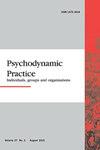Psychoanalysis, culture and contemporary discontents: a time of technology; fanaticism and pandemics
IF 0.4
Q4 PSYCHOLOGY, CLINICAL
引用次数: 0
Abstract
‘A man lives not only his personal life as an individual, but also, consciously or unconsciously, the life of his epoch and his contemporaries’ (Mann, 1962/ 1924, p.32). In terms of its broad sweep of contemporary cultural concerns, compression of argument, and clarity of exposition, this is a deeply impressive book. It is also, I think, an important one. Its title is intended in memoriam of Freud’s psychosocial treatise Civilization and its Discontents. Freud’s book can be viewed as a contribution to an established literary and philosophical tradition on the social contract between rulers and their subjects. Writers such as Thomas Hobbes, John Locke and Jean Jacques Rousseau sought to define the transactional nature of power within the political state, its limits and obligations, and in some cases to propose remedies for perceived ills. Things take a distinctly psychological turn with Freud. Extrapolating from his instinct theory of drives and structural model of the mind, Freud concludes that there is an uneasy pay off between the needs of individuals and the demands of the societies in which they live. In order to be able to live together at all, individuals must repress a considerable portion of their sexual and aggressive drives. The state is empowered to regulate their behaviours by other means, ensuring predictable social, legal, political and economic structures, and to reduce conflict to a minimum. Too much repression, however, increases the individual’s share of neurotic misery – the ‘discontents’ of Freud’s title. In Freud’s later metapsychology, the prohibitive pronouncements and aspirational ideals of an individual’s family and wider culture are internalised by the superego and ego ideal respectively. Civilization and its Discontents did not attempt to investigate contemporary sources of discontent at the time of its publication. Rubinstein’s book, on the contrary, examines some of the dominant issues of our time, as he sets out to explore the interplay between rapid development in digital technologies, the rise in fanatical ideologies, the Coronavirus pandemic, and their combined, unravelling impact upon the integrity of human subjectivity. Psychoanalysis, Culture and Contemporary Discontents (Rubinstein, 2023) contends that psychoanalysis must critically engage with transdisciplinary精神分析、文化与当代不满:技术时代狂热和流行病
“一个人不仅作为一个个体过着他的个人生活,而且有意识或无意识地过着他的时代和同时代人的生活”(Mann, 1962/ 1924, p.32)。就其对当代文化问题的广泛关注、论点的压缩和阐述的清晰而言,这是一本令人印象深刻的书。我认为这也是很重要的一点。它的标题是为了纪念弗洛伊德的社会心理学论文《文明及其不满》。弗洛伊德的书可以被视为对统治者和臣民之间社会契约的既定文学和哲学传统的贡献。托马斯·霍布斯(Thomas Hobbes)、约翰·洛克(John Locke)和让·雅克·卢梭(Jean Jacques Rousseau)等作家试图界定政治国家内部权力的交易性质、其限制和义务,并在某些情况下提出对感知到的弊端的补救措施。在弗洛伊德那里,事情发生了明显的心理转变。根据他的本能驱动理论和心智结构模型,弗洛伊德得出结论,在个人的需求和他们所生活的社会的需求之间存在着一种不稳定的回报。为了能够生活在一起,个体必须抑制相当一部分的性冲动和攻击冲动。国家有权通过其他方式规范他们的行为,确保可预测的社会、法律、政治和经济结构,并将冲突减少到最低限度。然而,过多的压抑会增加个体的神经症痛苦——弗洛伊德称之为“不满”。在弗洛伊德后来的元心理学中,个人家庭和更广泛文化的禁止性宣言和抱负理想分别被超我和自我理想内化。《文明及其不满》在出版时并没有试图调查当代不满的根源。相反,鲁宾斯坦的书考察了我们这个时代的一些主要问题,他开始探索数字技术的快速发展、狂热意识形态的兴起、冠状病毒大流行之间的相互作用,以及它们对人类主体性完整性的综合影响。精神分析,文化和当代不满(Rubinstein, 2023)认为,精神分析必须批判性地参与跨学科
本文章由计算机程序翻译,如有差异,请以英文原文为准。
求助全文
约1分钟内获得全文
求助全文
来源期刊

Psychodynamic Practice
PSYCHOLOGY, PSYCHOANALYSIS-
CiteScore
0.90
自引率
0.00%
发文量
41
期刊介绍:
Psychodynamic Practice is a journal of counselling, psychotherapy and consultancy and it is written for professionals in all fields who use psychodynamic thinking in their work. The journal explores the relevance of psychodynamic ideas to different occupational settings. It emphasizes setting and application as well as theory and technique and focuses on four broad areas: •Clinical practice •The understanding of group and organisational processes •The use of psychodynamic ideas and methods in different occupational settings (for example, education and training, health care, social work, pastoral care, management and consultancy) •The understanding of social, political and cultural issues
 求助内容:
求助内容: 应助结果提醒方式:
应助结果提醒方式:


